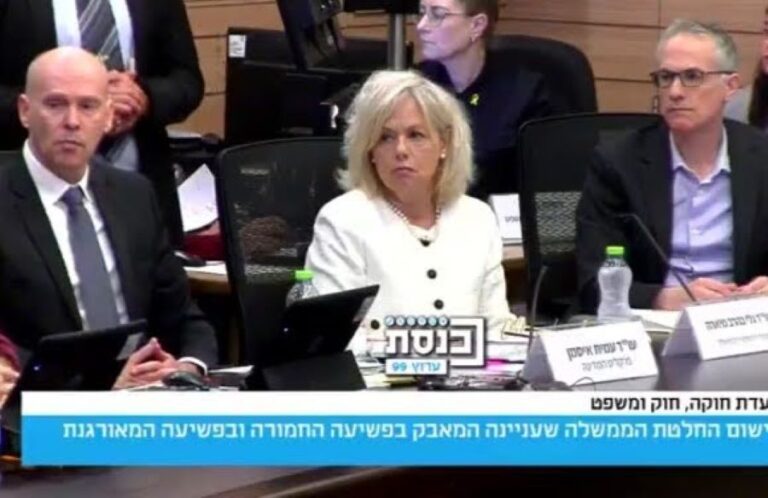 To YW and all its faithful readers:
To YW and all its faithful readers:
I am writing about something that I am sure many people who have made Simchos (weddings, Bar Mitzvas) have gone through, yet I have not seen any mention of in any public forum.
First, let me say that I am not writing to complain or kvetch, but to bring something I feel strong about to the public consciousness. Mi k’amcha Yisrael? The chesed organizations proliferate. Gemachs for just about everything exist and are growing. Hatzalah (of which I am proud to have have been a volunteer for 25 years) saves lives. Chaveirim helps in emergencies. Shomrim keeps neighborhoods safe. Misaskim does their Mitzvah of Chesed in such an unbelievable way and in the most trying times.. And on and on.
We have available to us Glatt Kosher, Chalav Yisroel, Yashan, pre-checked vegetables. And B”H we have become accustomed to being Mehadrin min haMehadrin in just about everything we do. It is truly a privilege to be a part of this Holy Nation.
Yet there is one thing that I see so often, and I can’t imagine why it is so easily ignored.
So much has been written about the skyrocketing costs of weddings and the toll it takes on the baalei simcha, financially, emotionally, and physically. Gelolim have tried to institute takanos to help alleviate the problem. Yet how often do people respond to a simcha that they will attend and don’t show up? Or just attend the Chupah and leave before the meal? Do they realize that the baal simcha has to give the caterer a number of attendees ,and HAS TO PAY FOR THAT NUMBER WHETHER THEY EAT OR NOT?
At a recent wedding, the Kallah’s father had to pay over $2,000 for people who did not attend!! I believe this falls into the halachic category of grama b’nizakin. You did not put your hand in someones pocket and steal money; and he cannot take you to bais din to recover his loss. But Grama b’nizakin has to be paid for at a later time, after 120 years on this world. What will we answer then?
The truth is that we can’t or don’t have to attend every single wedding that we receive an invitation to. Why don’t we just answer “Chupah only” or Simchas Choson v’Kallah, and wish Mazel Tov.
Certainly there are situations when we cannot attend because of a last minute emergency. Real life goes on and doesn’t stop because your friend is making a wedding. But when someone told me after the wedding that they didn’t come because he had a headache, I thought to myself, would that same headache have kept him away if his brother was making the wedding. I bet not! He would have taken some Tylenol (and a few more in his pocket) and gone to the chasunah. Shouldn’t we think that if it will cost your friend, acquaintance, Shul-mate etc. $60, 80, or 100 dollars per couple (or more) that we should push ourselves?
I hope you will not think that I am being small minded or picayune. We are talking about Yiddeshe gelt. Do we have a right to add to people’s expenses without a second thought?
Thank you YW for giving me the forum to express my feelings. And thank you Klal Yisroel for being the Am Kadosh that you are and (hopefully) taking my message to heart.











52 Responses
People shld be honest and reply honestly what they are planning to do. People shouldnt judge a person that doesnt show up and physically eat the food at the wedding. But he should probably pay for it with a check (gift), especially if he wasnt able to be mesameach through being there. But if he gave a gift what is the difference if he was there or not?
The Problem here is a problem of saving yiddishe gelt vs. Planning the yiddishe schedule… Sort of a catch 22
No, you are not being picayune. The Bais Faiga model, that is, the package deal, admirable as it is, is not available everywhere so this is a real problem.
It can be avoided or minimized by thinking outside the box, e.g. serving family style, or even buffet style (with assigned seating, of course). I’ve been to buffet weddings and the food is so much better than the baalei simcha could have afforded otherwise. While these options will still leave the baalei simcha with no show waste, they can so much more easily use the leftovers themselves.
1) Be Dan l’kaf z’chus. Maybe some people are not comfortable announcing that they won’t attend.
2) Even with return cards, one must use common sense.
3) Who pays $60 – $100 a couple? I B”H recently made a chassuna where the whole night cost $7,000 (band included!) It’s possible. Zeh le’umas zeh. The reason why we need the services of Hatzloh, Gemachs and the likes, is because of the anxieties of trying to live a higher life style. Do what I do. Fife em un! We live for the Rebono Shel Olam, not for the Joneses.
As someone who IS sensitive to this issue, I agree in concept to what you are saying, but I must tell you I have lost a CLOSE friend, because I answered very graciously how we are looking forward to joining in their simcha, but please do not reserve meals, knowing that I will stay for a while, but not for the whole evening. She was highly insulted!! Also, we all know how many simchas people have on a nightly basis, and the caterers encourage us to deduct 10% from our guest list (that responded!). People today are overloaded, parents are running out of the house just when their mesivta boys are coming home. The hop from one simcha to the other. Meals should be reserved for CLOSE family only and all others should be invited for simchas chosson v’kallah. The baalei simcha will save their money, and guests will be thrilled not to have the pressure to stay.
I agree that if one returns a card, saying they will, IY”H attend, they should make it their business to attend if at all possible. And, if another matter arises a week or two before, they should have the courtesy to notify the baal simcha that they can’t come.
However, part of the problem is the fault of the return cards themselves. They often ask people to decide far in advance. The people return the cards because they want to come. Then something comes up.
Also, there is no place on these cards to check, “Chuppah Only” or “I plan to stay for the dinner”
Maybe those choices should be added.
But, the other matter is a difference in minhagim between groups.
Many of us to not even send return cards with the invitations. We write that we expect you to come.
Many of us also post an invitation in the beis medrash and/or yeshiva.
These more open-ended minhagim are beautiful, and they encourage a last minute person to come instead of not coming because they were not invited or because they did not return some card.
But, also, some simply take the invitation out of the envelope, put it on the fridge, and toss the rest of the envelope away, not even noticing the rest of the contents. They think those are directions inside, and they already know where the halls are.
I normally assume there will not be a return card, for it is not my minhag. But, I understand that some people use them.
Maybe we need to find out how the caterers work with those simchas who do not use cards, and ask them to work the same way with the others.
Maybe we need to be a bit firmer with the caterers, and tell them that we do not want these rough contracts. Most caterers are ready to serve extra people. So, if you have 200 people who you expect to come, tell the caterer 170 – 180. There will be enough food. If more come, you pay the higher amount. If fewer come you are not obligated. One caterer recently told my daughter, “Always take 10% off of what the response cards say.”
an idea-maybe the caterer should only charge for how many plates actually went out, and ended up being eaten(have a waiter count per table). i’ve been by countless weddings that there are empty seats but have full portions! this is also real baal tashchis! this will save $$ and save the aveirah of food that ends up going to the garbage!
I think the author has a good point. It takes a sensitivity to think this way about other people and people should try to develop a greater awareness of how their actions effect others.
Well, it’s not quite the way this writer portrays it.
Theere is something in the catering trade known as “minimums.” This means that, even if you have only 50 couples coming to your affair, you have to pay for the “minimum,” which is usually 150 200 couples.
What a waste!
I suggest that we consider doing weddings in the backyard of shuls, like we used to in Europe.
I visited Budapest, and they still have the Chuppa structure set up in the backyard of the main shul.
Let me get this straight, if I show up and eat at the wedding this will save the bal simcha money? Or it just makes people feel better if you show up.
(The money was spent anyway)
I dont understand the diffenrece between not showing up for the meal and attending but not eating everything for whatefver Reason ( dislikes etc).
So much food gets thrown out in any case, with the smorgesbord and sweet table , deserts etc…
Another issue which is quite bothersome is the fact that people tend to give more expensive gifts at a wedding which is elaborate and austentatious. Whereas the weddings which are moe humble, and where the couple probably needs more are not given the same attention. why is that? Is that logical???
#1, the gifts are for the kids, not the parents. I did not look at ANY of the checks my kids got at their chasuna.
#7, a chuppah only option would necessitate the extra postage and printing costs. And, if an envelope is included, people will feel obliged to give a gift when they may not have otherwise. So both sides lose.
#8, interesting idea but unfair to the caterer. What’s he to do with the extra, unpaid-for food? Hold onto it for the next night’s no-shows?
#9, I would love to stay for sheva brachos, but I personally can’t stay up too late. And people who need baby sitters have to get them home by a certain time.
#11, I was at a “community sponsored” chasuna in the US. It was beautiful. I would guess though, that not too many people were traveling to Budapest just for the chasuna; they were all there already. B”H many of us have extended families and this wouldn’t be feasible.
My apologies to the olam if I came off too critical.
The caterer needs a ball park figure how much to prepare, but, an exact number need not be given. However any leftover food rightfully belongs to the ba-al simcho and should be packed up to be frozen if he wants, so he can take it home and use it for sheva brochos or whatever.For many Chasidic chasunas return cards are never sent and there always seems to be enough food. I personally think the buffet style is really the best way to go.
There are valid points raised here- having made a number of Chasunas I can identify with the letter writer-
I would also like to raise additional points- only once was I presented with left over food after our chasunah- I will be don lkaf zechus and presume that the leftovers were given to organizations that distribute it to the poor- perhaps through this we have a shulchan aniyim-
In addition- the point has been raised by illinio7 that it bothers him that people leave before Sheva Brachos- I have been to numerous weddings where the chosson kallah have not made their grand entrance till after 10 pm on a weekday nite- WHERE IS THE YOSHER in this practice??- for those of us that arise early to learn and work it is impossible to stay the whole evening- If you call a chupah for 7:30 pm- the meal should be over by 10- 10:30 the latest and the second dance can take place after benthing-
illini07, if the sheva brachos could be at a reasonable hour, many more could stay, but just because someone does not stay until midnight or later with a family waiting at home, they shouldn’t come at all in your opinion?
This is no way a Grama Benizakin, what does he gain or loos if he egnores his headache and comes or not? and when he reserved he didn’t know he’ll have a headache!
I guess your complaint is a combination of money – and sharing others Simcha and pain… careless reservations…
To DoesItReallyMatter, It’s not a matter if you show up will it save the bal simcha money. It’s a matter if you made a reservation at a restaurant or if you made a doctor’s appointment and you didn’t plan on showing up, would’t you give them the courtesy and cancel. The same courtesy should apply when you cannot or don’t want to attend a wedding that you responded to ,that you will attend.
In my house Derech Eretz is important.
I recall a wedding the night after my wife gave birth and I called the baal simcha before to appologize.
the best eitza
return cards we do not send for we hope you will attend!!!!
#15 and #22
it was just an idea. however the extra food can be sent to a local yeshiva or for a meshulichum.
and the baal simcha should maybe subtract 50 (meaning if 400 guests say there coming tell the caterer that 350 are coming) guests and if they show up at the end, just add it-every caterer makes extra portions!
Good issue to bring up. I was at a chassunah recently. The truth was I didn’t really want to go as I wasn’t feeling well that night, but I had RSVPed for DH and I and so we both went. I was SHOCKED at the number of empty seats and place cards not picked up and felt terrible at the waste of $$$.
However, at 10 p.m. not only was it not time for sheva brachos, the main course hadn’t even been served and the first dance showed no signs of slowing. I benched quietly at my seat and walked out at 10:15 to the music still blaring and no signs of dinner. While I am sorry to the baal simcha that we had to leave without eating, we had a schoolgirl at home (who had to be up early in the morning for classes) watching our little ones who get up when DH gets up at 6:15 a.m. to start his day, which means I get up at 6:15 a.m. also.
Consideration has to go in all ways.
Let’s hire a statistician to tell us how many people actually show up when return cards are sent. Then, thecaterers can make the necessary adjustments in the number of portions.
A buffet can be set up for those who show up beyond the estimate.
#27 ..and will have a sign “those at tables sitting do not touch, children do not touch” and hire gaurds for those tables and anyone who came late will have to prove he’s not sitting at reg. table…yes yes bright ideas keep popping up
In a certain out-of-town community I know of, Sunday weddings are held during the day, so people can get home to sleep and get up for work the next day.
I like the model of doing the simchas in the shul, though since land is so absurdly expensive, it would cost much more in annual membership fees for the shul to be able to afford a decent amount of land to have a wedding hall.
Personally, I think weddings would be much cheaper to make if:
a) the chuppah (if not the whole wedding) were done in shul, like, lihavdil, the goyim do in their places of worship.
b) the photography of both sides, together, would be done before the wedding, like sefardim do, so there is no 2 hour wait after the chuppah
c) there would be no sit down meal for 400 people – chuppah followed by a smorg followed by dancing followed by dessert (followed by more dancing) and sheva brachos should be MUCH cheaper than having that sit-down meal at $40-$100/plate. For family and very close friends, a sheva-brachos-like meal would be held afterwards.
In other words, a 3 hour wedding with no full meal means that you would pay the band, caterer, photographer and anyone else, far less than having to pay for 5 or 6 hours and 400-guest multi-course poultry meals.
It will also save everyone money if the menu cost less! Weddings should be less indulgent altogether. That will save money and victims of heart attacks.
R’ Yehuda Hanasi was buried simply even though he the richest person around because he saw a lower standard had to be made as far as the burial expenses people were spending. A similar stand is needed today for weddings (that will be taken seriously).
The difference of the expenses should be sent to hachnosas kallah, which is a great zechus to start a marriage with.
illini07 – Apparently you don’t live in NY, where on average benching and Sheva brachos are at about 11:30. The biggest avla about the time for benching, is that most people who were there for the second dance do not stay for benching due to the standard ridiculous delay of sometimes almost a half hour until benching starts after the dancing ends? Why is this? I have left many times before benching because of this.
Getting to the original comment, I have always believed that if we cut out inviting the people that we only invite because we don’t want to offend them, and if people don’t attend weddings that they only go to not to offend the baal simcha, the guest lists would be half the size. The guests would only be good friends who will come and stay all night. And of course the weddings would be half the size, and we wouldn’t have a chasuna to attend every night.
How many times have you gone to a wedding only because you didn’t wantto offend the baal simcha, but he only invited you so not to offend you!
In many weddings in Eretz Yisroel, many people come only for the dancing and there is a nice buffet prepared for them. The standard of meals are also MUCH simpler. With all the simplicity, there are usually a few tables for uninvited people to come, aka poor people who come to get a free meal. They are tzedakah tables, which I think is beautiful.
#31 you are so right. But take a look at the minimums of the halls and you will see why you were invited – to meet the minimum, so that the hall won’t look empty, and the portions are being paid for anyway. I know someone who was actually looking for guests to meet the minimum.
Also, I think that spouses don’t necessarily have to be invited just because the other spouse is a friend (shana rishona excepted, possibly).
Tzippi (post#3) what is the Bais Faiga model??
34,
Sorry, inviting a husband without a wife or vice versa is like inviting a half a person….
‘Eizer Kenegdo’,ok, the other spouse doesnt have to accept, but should defintiley be acknowledged!
firstly in bais fayga hall (lkwd), the music stops at exactly 11:00 sharp! this way not only the guests go home at a normal time, the chosson and kallah also do!
secondly, who said we need to serve a lavish shmorg with a couple of hot dishes, salads, fruits, a bar… and then have a 4 course ostantacious meal? do you really care that yankel or shmulik was served a hefty meal that night?!?! or is it you want the town to talk about, “how great the food was at ‘so and sos wedding’ the night b4.”?
#34 Did you mean that seriously?
#37 Thanks for the eitza. Makes sense.
I can’t read all the responses. But I have made a few chasunas that ran very much on time, with benching the latest by 11:00pm – more than half the people were there for benching. If a Baal Simcha doesn’t feel it important enough to regard other people’s time, you can’t get offended when they leave to be able to get up on time the next day for shul or work…
The caterer also gave whatever leftovers there were, so the family had the Hanaa from that.
#16 Bas Melech,
Why should the extra food go to the Baal Simcha? The caterer is paid to feed the number of people he is paid for. Any extras should be the caterers to keep, sell, donate, etc…. Just because the caterer makes some extra to be sure, doesn’t mean he gives up rights to it.
#34 It is inpolite to invite only one spouse, however, not both have to attend. You can answer “yes” for only one.
#42
im sorry if you misunderstood me, im talking about an overabundance of food, i never said no shmorg.
A YWN reader submitted the following comment via email:
The wasting of food by simchos is indeed a terrible problem, both in terms of financial loss and in terms of “Bal Tashchis”. It really hurts to see the tremendous amount of food that is constantly being thrown out. If only the food would not have been put onto peoples’ plates, how many hungry people, yeshivos, etc. could have been given that good food!
I think that this crime can be significantly mitigated if every place setting had a list of the entire menu with instructions to check off every item the person wants. I obviously do not mean that there would be extra choices because of this. Rather, if the Baal(ei) Simcha decided, for example, on grilled chicken, potatoes and peas for the main course, the menu would list these three items under “main course”. The waiters would then serve only that which is checked off.
It obviously would be best to get to the root of the problem at hand; that of people unfortunately being oblivious to the crime of waste. That requires a whole separate discussion. But I want to make one comment regarding that. We have grown up in a disposal society, and children, as well as adults, don’t think twice before throwing things out. I would say that more often than not, when people need to use tissues in a public place, such as in a shul that has a supply of tissue boxes, they do not think if it is necessary to take the second or third tissue. The attitude is: “Oh, come on, what is a tissue worth?” This is a terrible attitude. A child, at a young age, should be taught to use one tissue, and if necessary, take a second one. A child with such an upbringing would grow up to be a real mentch.
Getting back to simchos, by checking off menus, people will hopefully feel more responsible and request only the food that they expect to eat.
At 3 chasunahs that my parents made for my brothers, bentching and sheva brochos followed the main course before the second dance. This is a very important thing to do because first of all, people will stay to bench (and therefore won’t forget to bench) and if they have to leave they have still participated in the most important parts of the simcha without losing a night’s sleep. Also, the men you want to give the kovod of benching/a brocha are more likely to still be there. I was at a wedding recently that started benching so late, they had to ask a few boys who were just barely Bar Mitzvah to say a brocha. there wasn’t anyone else left.
This is fun. There have been alot of interesting suggestions put forward. I think, though, that the bottom line is that the matter of consideration towards others extends to both invitee and inviter.
On the part of the invitee:
a)If one is unable to attend in enough time to inform the baal simcha, then that should be done. b)If something comes up at the last minute which makes it impossible for someone to come, then an apology should be forthcoming either through a phone call or a short letter.
It seems to me that these are the correct ways in which to act whether or not the baal simcha and the caterer has taken into consideration the general percentage of people who don’t show up. c) Courtesies extend, as well, towards the invitee to make certain that his return card is sent back on time so that the baal simcha is not forced to call to confirm.
d) If someone confirms his attendance, he should be certain to send some kind of gift. If, for financial reasons it is impossible to do so, a letter graciously thanking the baal simcha for the invitation, stating how much they enjoyed sharing in their simcha and wishing the young couple well should go out.
e) In today’s social circumstances when many people find themselves invited to quite a number of chasunas on the same day, it is standard for people to merely show up to wish the families mazal tov. This should be noted, by them, on the return card. Unless this is done by an especially close friend, there is no reason for the baalei simcha to feel insulted by this — rather, they should be grateful that the individual is often foregoing their own pleasure in being able to sit and eat comfortably at one simcha, rather than run all over the place to wish mazal tov to many families (and often come home hungry in the process). One must always act correctly irregardless of how others choose to interpret one’s action.
On the inviter’s part:
a) try your best to keep to a schedule. Do not allow picture taking to extend longer than is absolutely necessary. If you know that for some reason that this is not possible, give instructions that the meals should be served within a reasonable waiting period, whether you are there or not, so that people do not have to wait around for so long.
b) elaborate smorsgasbords are, I believe, a waste of money — unless one invites a number of people only for the chupah, in which case, it is only right that they should be adequately fed. By having a less elaborate smorsgasbord it allows for the chuppah to start closer to the scheduled time (which should be a reasonable time given that guests often have to travel great distances to attend and generally only set out to go after work).
For some people buffet style is very uncomfotable would you ever see your rosh yeshia go get himself a plate of food so thats not for every one
to #29 mr hakatan 1)we have issur to conduct chupah in shul beause of “chukas hagoyim” 2)chosen kalleh do not see each other before chupah.(maybe can take family pictures without them then photographer can splice..) What the minhug by sefardinm I dont know 3)standing aroumd and eating is not called a seudas mitzvah, besides past nisht for ben torah to eat or drink standing (see hilchos seudah ohr hachim) and dont tell me about those ten cocktail tables for 300 people. any way its not called seudas kovia..and what do you expect the ehrlica temimesesdiga yiden or talmidai chachamim who will not go to smorg and push and shove to get some thing to eat can go on and on..and tell us when would those 3 hrs start from when the kalleh come to the hall? you think 300 people can march in like soldiers to a wedding from beginnig of your 3 hrs to…..its no use , sometimes people start giving bright ideas without thinking
Why not put check boxes on the response card:
I will I”H attend
{} Chuppah only
{} stay for the dinner
{ } simchas n
A truthful RSVP would also avoid another unpleasant chassunah experience. When we RSVP, attend a chassunah, and end up sitting at the table we are assigned, where half of the seats are empty. Not only has the baal simcha paid for meals that are not being eaten, but those who are there for the meal end up without company at their meal. Seems to rather lessen everyone’s enjoyment.
interesting,. no one asked about “daas torah” here.
well, that’s because “daas torah” specifically exempted themselves from their own “takanah” knows as simcha guidelines (google it to find the text).
to the one who commented that weddings in budapest are in the back of a shul, this cannot vbe so. hungarian rabbonim in 5626 met in micholvich (today michalovce in “slovakia”) and mades severak importasnty takanot (sucvh as a shukl without a bima in the center is forbidden, etc) and that weddings are forbidden in shuls. so today, hungarians (even in america) do NOT have weddings in shuls (or outside of shuls) (the shayla is — what about a consrevative / reform “temple”?)
for all the talk here of not giving full meals, etc to guests, it wont fly. it is expected, and thats that. true, a surprising 10% or more of people one definitely expects to come, will surprisingly not show up. and caterers always have 10% extra to supply, so better to (somewhat) understate to your caterer.
there is a TREMENDOUS amount of food thrown away at every simcha! some organizations, such as “shearit haplate” will come and collect this food, but this is only a dropp in the bucket. and goyishe caterers (and some that do kosher jobs) are afraid of legal liability for giving possibly dangerous food, or more probably, will get sued even when they dont supply the food, or the food is not properly refrigerated, etc.) so from a civil legal perspective, it wont go.
dont get me wrtonmg, i support many of the proposals mentioned here.
anfd by the way, i am involved in food service business, so i know what i am talking about.
33, what some places do is set a minimum, say 300 people for 20/head, and if you have less, they will charge 25/person. It would be great if this were widespread.
35, Bais Faige has a bare-bones package, 350 people for $$$$ (and you can have fewer with a price adjustment) and a very specific menu. You are given some, but very few, choices. (Choosing a menu took 5 minutes 😉 You can get fancy, if you feel like paying more. The bare-bones is actually quite bekovedik. Clearly they can do it there because the hall is bli ayin hara so busy so they can keep the costs down.
I b’n always respond I’ll hopefully be there but don’t pay for a seat.
I don’t eat dinner at 10 pm.
If I’m hungry I will eat at the shmorg.
The seuda should just be for family and out of town real close friends.
ALSO the meal shouldn’t be held hostage until after the first dance. That’s crazy. Chuppa, seuda and by the time they come out we can dance and leave and go to sleep at a normal time.
To smr – I disagree with you on that the food belongs to the caterer. The caterer is probably not allowed by law to use over the food that is left over and besides usually the baal simcha has to pay for a minimum of portions, so if less than that amount of people show up for the simcha, the baal simcha has to pay anyway, so the leftovers should go to him.
Ps notice that right after this article is the one about at risk. People who r out every night with chasanas they don’t have to go to are putting their kids at risk
#52, I did receive a response card like that. It was perfect (I really should have responded :o) to that one).
regarding the issue of husbands and wives going to the Chassunah – both should be invited and let them decide if they both can go. with K’AH a house full of kids, there have been more than 1 Chassunah where, my wife went and I stayed home (or the opposite way) and we responded as such. sometimes we both attended, but had to go separately (location, time – many factors) generally speaking, the only time you see your spouse at as Chassunah is when you park the car and when you leave. The rule that we apply is if it is close, mrsmdlevine goes, if it is further, I go – (if able we both go) but we switch depending on circumstances.
May we always have simchos to share in!
why cant we adopt a standard of having family only for the seudah,and everyone else for a shmorg.
i was at a bar mitzvah recently where this was done. the simchah was beautiful and i didnt mind being invited for the shmorg.
the only way for things to change is if people who can afford the lavish affair cut down to a more simple simchah and set an example for eveyone else.
Recently I was at a most beautiful chasuna that solved this whole issue and alot more. The Shmorg was served after the chuppah,and Simchas Chosson V’kallah took place right after that. It allowed everyone to participate in exactly what the purpose of a chasuna is meant to be, SIMCHAS CHOSSON V’KALLAH. After that the seudah was served to family and out-of-town guests only. Of course many others came to join for dancing later, and were served kugel and fruit. It alloed people to join without wasting so much precious time. the Baal Simcha tols me that it also saved around $5000..
I hope to be able to make mine like this IY”H. It’s time someone finally put sanity into simchos
this letter is unbelievably accurate as far as i am concerned. at my daughters wedding which ran early (not just on time) when i looked around the hall during the serving of the main course (9:45 p.m.) half the tables were already empty. i do understand people leaving on a weeknight when a chosson and kallah spend too much time taking pictures etc and come our ridiculously late for the first dance, but when things are run in a timely manner it seems unfair to pay for guests who never had any intention of staying and eating. the ehrlicher caterer at our daughters wedding told us point blank to undercount. he said to take off 20% for “friends”- (real friends do stay!…fringe friends who should not have been invited to begin with and the tend to”sneak out”) the caterer even suggested we should reduce by 10% for family. we did just that and still had empty seats. when i analyzed it later i realized that those people who did not stay should never have been invited for the whole wedding. so when it came time to make up a list for my son’s wedding i deleted most of those “fringe friends”, and at his wedding when we looked around during the serving of the main dish 99% of the seats were filled (with those who really loved and cared about our simcha) it’s time to start X-ing people off your lists!